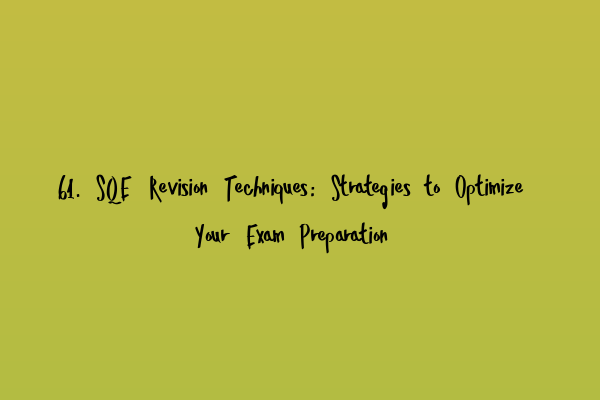SQE Revision Techniques: Strategies to Optimize Your Exam Preparation
Preparing for the Solicitors Qualifying Exam (SQE) can be a daunting task. With the recent changes in the examination structure, it is essential to adopt effective revision techniques to maximize your chances of success. In this article, we will explore some strategies that can help you optimize your exam preparation and ace the SQE.
1. Create a Study Plan
One of the keys to successful exam preparation is having a well-structured study plan. Start by identifying your strengths and weaknesses in the various areas of the SQE syllabus. This will allow you to allocate more time to the topics that require more attention. Additionally, make a realistic schedule that includes dedicated study time, breaks, and revision sessions. Stick to your plan to ensure consistent progress.
2. Master Time Management
Time management is crucial during the SQE exams. Practice efficient time allocation by taking timed mock exams and timed practice questions. This will help you familiarize yourself with the format and pace of the actual exam. Check out our related article on Mastering Time Management in SQE: Strategies for Efficient Exam Completion for more tips on this topic.
3. Utilize Practice Questions
Completing practice questions is an effective way to reinforce your understanding of the SQE syllabus. Familiarize yourself with the types of questions that are commonly asked in the exam. Try to solve different variations of the same question to develop a problem-solving mindset. Our article on Conquer the Multiple Choice Questions (MCQ) in SQE1 will provide you with valuable insights on tackling this specific question format.
4. Emphasize Active Learning
Passive reading of study materials may not be sufficient to retain information effectively. Engage in active learning techniques such as summarizing the content in your own words, creating flashcards, and teaching concepts to others. Actively participating in the learning process will strengthen your understanding and improve your knowledge retention.
5. Take Breaks
It’s important to give your brain some downtime during intense study sessions. Take short breaks every hour or so to recharge. Engage in activities that relax and rejuvenate you, such as going for a walk, practicing mindfulness, or listening to music. This will help prevent burnout and enhance your overall focus and productivity.
6. Seek Support and Collaboration
Don’t hesitate to reach out to your peers or join study groups to discuss and clarify difficult concepts. Explaining concepts to others can deepen your understanding and uncover any gaps in your knowledge. Additionally, discussing different perspectives and approaches can help you think critically and expand your problem-solving skills.
7. Utilize Online Resources
Take advantage of online resources and revision tools specifically developed for the SQE. There are numerous websites, forums, and practice exams available that can supplement your study materials and provide additional practice. SQE Mock exams are also a great way to simulate the exam environment and assess your preparedness.
8. Reflect and Improve
After completing mock exams or practice questions, take the time to reflect on your performance. Identify areas where you can improve and focus on them during future study sessions. Understanding your strengths and weaknesses will allow you to allocate time more efficiently and tailor your revision techniques to suit your needs. Check out our article on Understanding SQE Feedback: Extracting Valuable Insights for more guidance on utilizing feedback effectively.
9. Stay Healthy
Finally, make sure to prioritize self-care during your exam preparation. Get enough sleep, eat nutritious meals, and engage in regular exercise. Physical and mental well-being are essential for maintaining focus, concentration, and overall performance.
In conclusion, by implementing these strategies, you can optimize your SQE exam preparation and enhance your chances of success. Remember to stay committed, consistent, and adapt your revision techniques as needed. Good luck!
